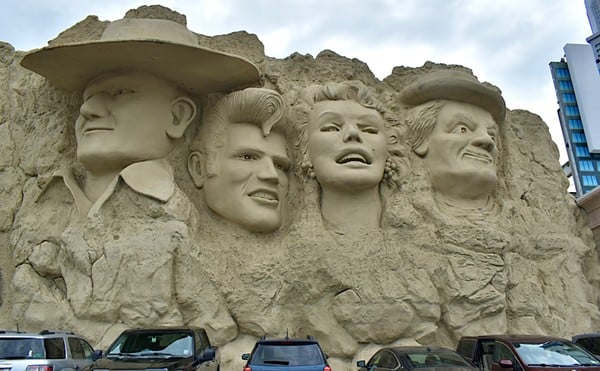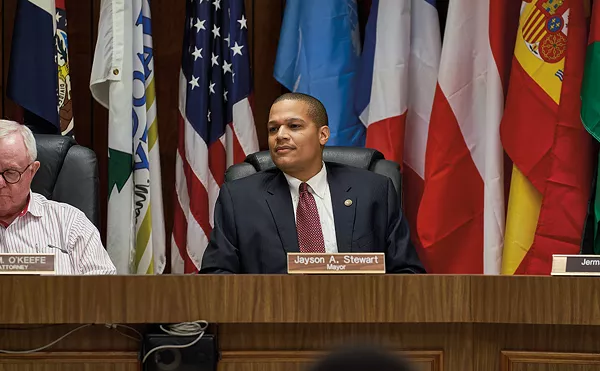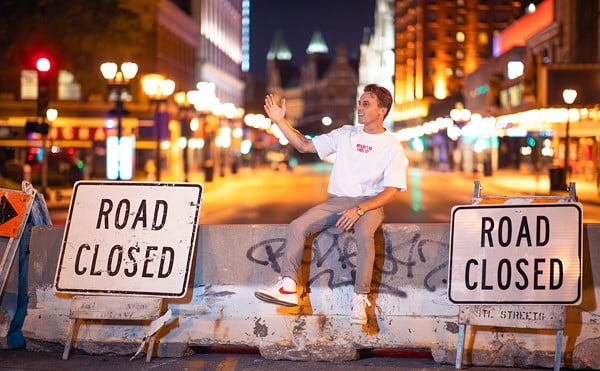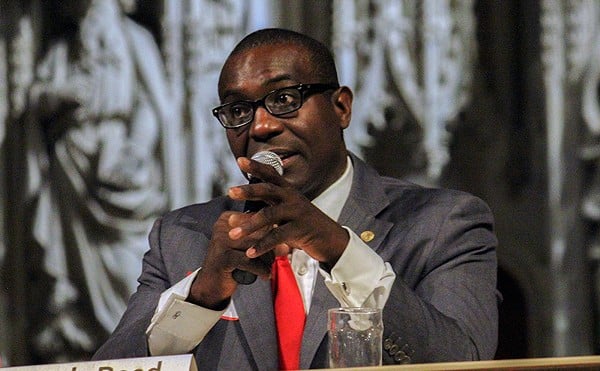
Major Jim Youchoff is the commanding officer for the St. Louis Brigade of the Missouri Militia, and he looks exactly how you'd expect him to look, based on that title: 57 years old, sporting camo from head to black lace-up boots, with a white handlebar mustache. He sits in the front seat of a blue Ford Excursion, along with three of his men. Two more men are following in their own cars. He grabs a walkie-talkie off the dash.
"Alpha Two and Alpha Three, hopefully this next job'll be more productive than the last," Youchoff, or Alpha One, says with a grin.
"Roger," responds Alpha Three, Sergeant Major Paul Kruse, a good-humored six-foot-six-inch former Navyman, driving behind the Excursion in his gold Nissan.
"Roger that," responds Alpha Two, Lieutenant Jeff Thomas, a fit 40-year-old former Marine nicknamed LT, who trails the convoy in his white pick-up truck.
The militia men are in Joplin to assist with the relief effort after the record-setting tornado that tore through town May 22. They're driving toward the next address on their list of people-to-help, as designated by the local New Creation Church. They're all volunteers, who pay their own expenses and work real jobs between their weekends of service.
They joined the Missouri Militia because they wanted to help their communities -- or because they saw the nation going down the shithole and wanted to buckle down with like-minded men -- or because they're grown adults with families and need an outlet where they can go camping with the boys and exchange self-depreciating wife-jokes for a weekend. Youchoff likes to describe his militia as a volunteer National Guard.
These six Missouri Militia members wanted to make the five-hour trek east from St. Louis the weekend after the storm hit, but were turned away by FEMA because the town was already crowded with volunteers. So here they are, three weeks after the storm: six strong, professionally-trained men, willing to do whatever they can to fix up this town.
These men train for scenarios just like this -- whether it be natural disaster, government collapse, civil war, riots, search and rescue, anarchist revolution, or whatever else. Their monthly training sessions include first aid, radio communications, terrorism prevention, land navigation, road clearing, marksmanship, biological warfare preparedness, all-weather survival, and any other fundamental skill necessary to subsist in a post-apocalyptic America. And they are absolutely ready to put their skills to use. They're chomping at the bit to clear downed trees and carry heavy things and operate large machines and search for children trapped in debris.
But one of their first assignment in Joplin...Well, they'd been told that they were going to patch a roof for an old man. They packed tarps, hammers, roofing nails and a ladder into their trucks. But when they got there and told the old man, "We're the Missouri Militia and we're here to patch the hole in your roof," the old man replied, "Hole in my roof? That's the first I've heard of it."
When the militia men circled the house, there was no hole in the roof. But Thomas did notice that a rubber wind guard had blown off, exposing a couple feet of the roof's wooden frame. "Well, we're here and we have the roofing nails. Might as well," Youchoff said. So Thomas climbed onto the roof and nailed the damn wind guard in place while the other five men stood in the backyard and watched.
"This is like a Union job," said Kruse, with a chuckle. "One guy working, five guys watching."
This next assignment, though, the one they're driving to, seems more urgent. They've been told to bring a power washer, after all. The house must be absolutely doused in mud and grime or maybe even that deadly fungus going around, they think. They are curious, then, when they drive past the destruction zone and onto the house's block, where every home remains standing -- maybe a few shingles out of place at the most.
"Is this the address?" asks Thomas.
"Yup, this one right here," says Youchoff.
"Jeez, this is cleaner than my house!" says Thomas.
"Well, we're here and we have the power washer, so might as well," says Youchoff.
Thomas smiles out of frustration, shakes his head, and sighs.
The woman who lives at the house points to the "dirty" part that she wants cleaned. Apparently, an oak tree had fallen during the tornado and splashed a few bits of mud onto the side of her house.
Two of the men, brothers Jeff and Brett Halfaker, roll the power washer around the house, spray the speckles of caked dirt for a few minutes, then roll it back into Thomas' truck. The woman thanks the men.
"You boys National Guard?" she asks.
"No ma'am," says Youchoff.
"Army Reserve?"
"No ma'am. Missouri Militia."
"Oh."
When Youchoff tells people that he and his men are with the Missouri Militia, he nods his head, purses his lips, and bends his mouth into a faint half-smile. He says it with the pride of a heavyweight champ. After all, he badly wants all these people to know who the real Militia is. To distinguish the good guys like them from those bad guys always shown in the media.
Youchoff isn't angry at the media, though. He's angry at all those crazy hate-mongering anti-government racist right-wing extremists who have tarnished the good name of constitutionally-appointed militias like his. Like that "militia" -- he uses air quotes to when he talks about the crazies -- in Michigan that planned to shoot cops. Or that "militia" in Minnesota that demanded $100 trillion from the FBI for "unlawfully" targeting them. Or that "militia" Timothy McVeigh claimed to be a part of. Or any of those other "militias" that the FBI considers threats to national security.
It's a tough image to shake. Especially when the sixty or so members of the Missouri Militia's St. Louis Brigade are all white males. Youchoff and Kruse and Thomas and the rest of the guys stress that they welcome everybody. But the popular perception of militias keeps many people away. In fact, Thomas admits that he was skeptical before joining. So was Steve Woodrow, the sixth member of the group.
But they did join, and so here they are in Joplin nailing wind guards and power-washing houses. Later on in the day, they carry a woman's belongings out of an annihilated storage facility. Then, as the mid-afternoon sun emerges from behind a wall of clouds, they clear bricks and wood and steel from the remains of a house. There they stand on the heap of rubble, six middle-aged men wearing camouflage clothes heavy and wet from sweat.
When the night comes, the people-to-help list has been completed, so the men pile into their vehicles and head out of Joplin.
"I thought we'd have more work to do," says Youchoff, staring out the window toward the empty sidewalk. "More steady work... Oh well. We're here."
"At least we helped a couple of people out today," says Jeff Halfaker.
The men in the truck nod in agreement.





